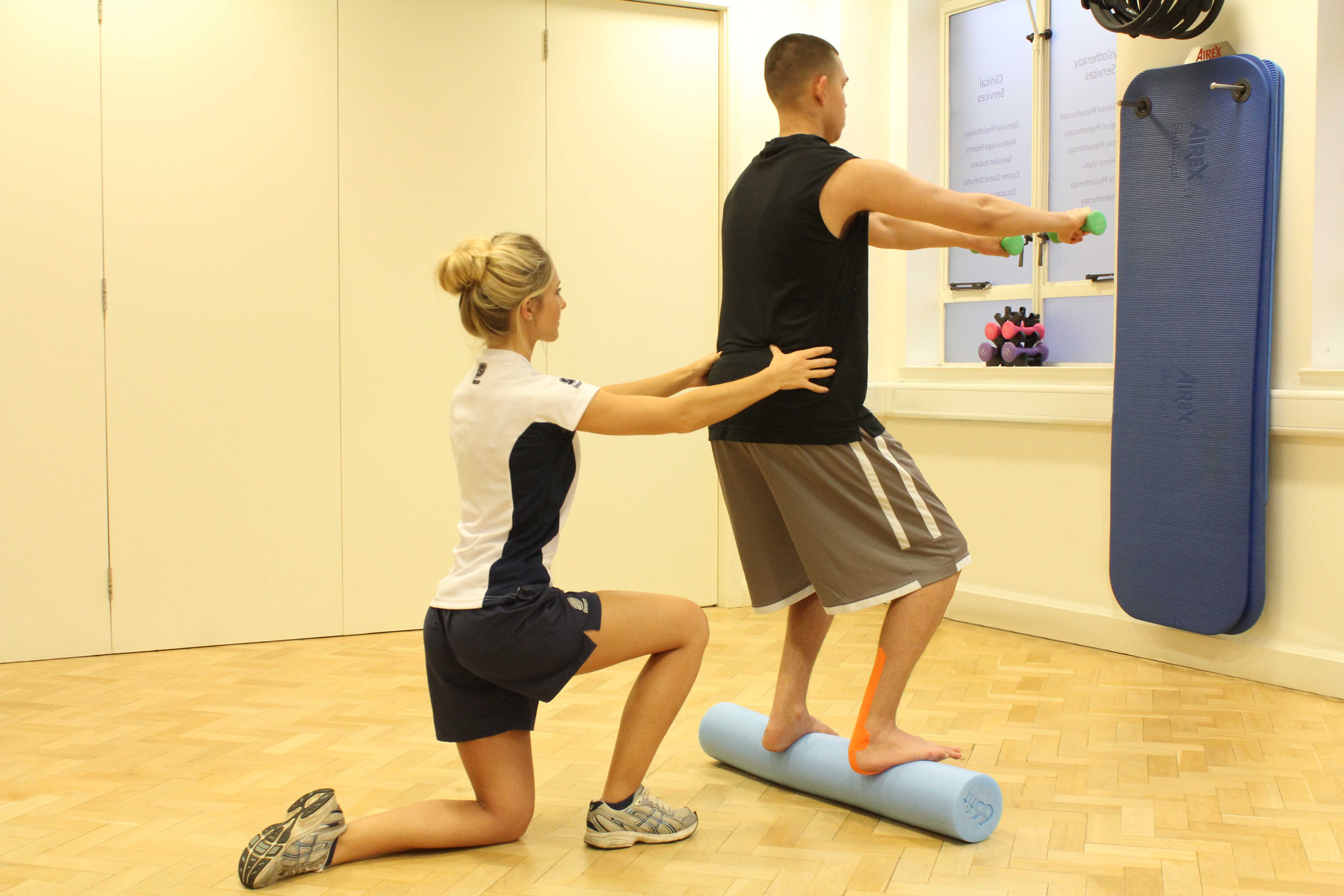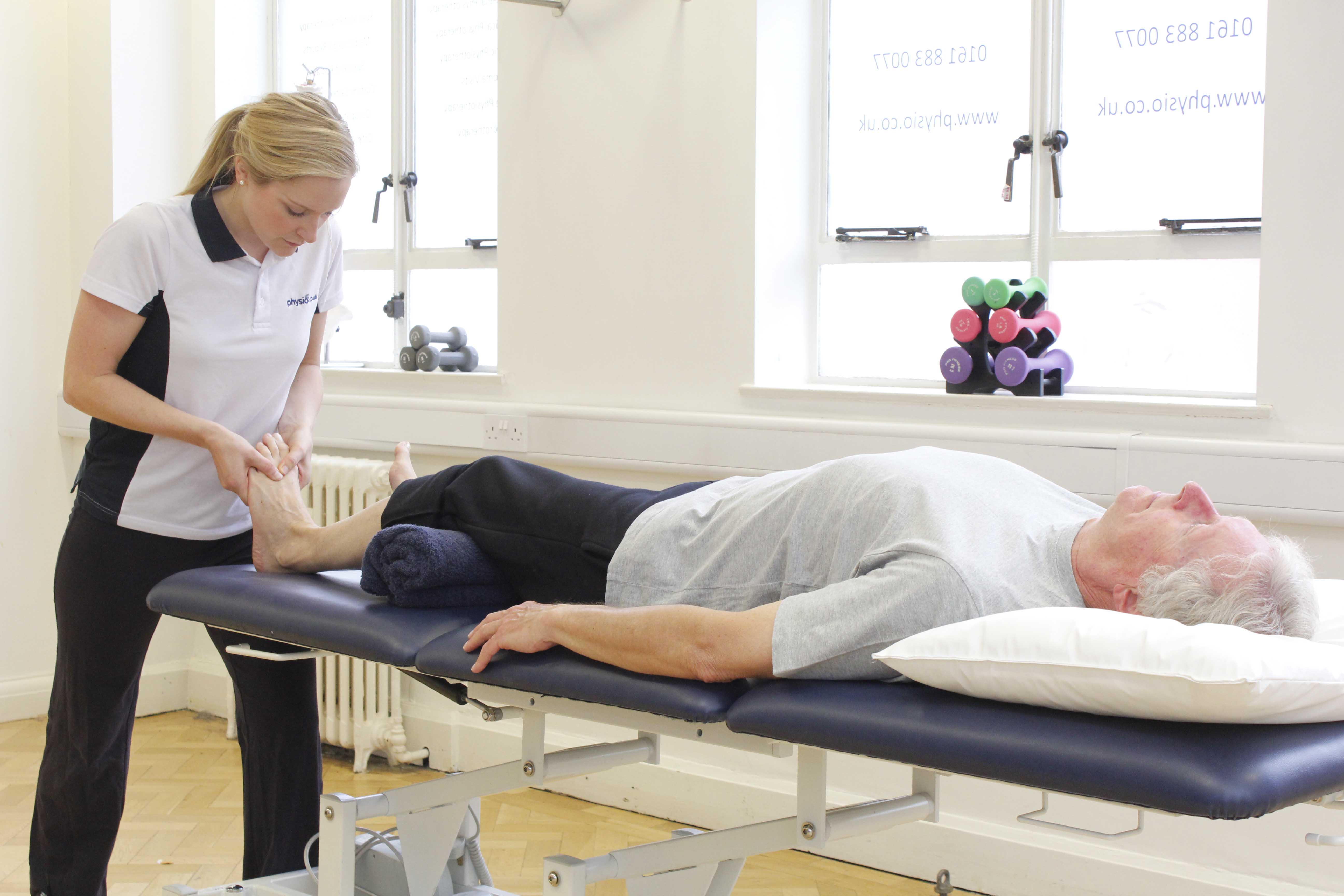What is flexor hallucis longus tendinopathy?
The flexor hallucis longus is a muscle in the lower leg that passes behind the bony bump on the inside of the ankle and along the inside of the foot. The flexor hallucis longus bends your big toe. Flexor hallucis longus tendinopathy is swelling within the tendon of this muscle. Physiotherapy is a successful treatment for flexor hallucis longus tendinopathy.
How does flexor hallucis longus tendinopathy happen?
Flexor hallucis longus tendinopathy is caused by overuse of the flexor hallucis longus tendon. Repetitive use of the flexor hallucis longus muscle and, therefore, the flexor hallucis longus tendon can cause microscopic tears within the tendon. To repair these microscopic tears, the body commences an inflammatory response. This inflammation within the tendon is tendinopathy.
 Above: Ankle stability exercises, with supportive tape, supervised by therapist
Above: Ankle stability exercises, with supportive tape, supervised by therapistWhat are the symptoms of flexor hallucis longus tendinopathy?
Flexor hallucis longus tendinopathy causes a gradual onset of pain underneath the bony bump on the inside of the ankle and along the inside of the foot. The initial signs often disappear with movement, massage or heat over the inside of the ankle and, therefore, are often ignored. However, if you continue to exercise, the tendinopathy will progress and the pain within the tendon worsens to a point where your pain is present all of the time. Symptoms may include:
What should I do if I have flexor hallucis longus tendinopathy?
Flexor hallucis longus tendinopathy generally does not normally get better on its own if the cause is not addressed and you continue to exercise. If you suspect that you have flexor hallucis longus tendinopathy, you arrange a physiotherapy appointment as soon as possible. In the meantime, you can start initial treatment. You should rest your leg and apply ice to the inside of your ankle using a bag of frozen peas or crushed ice wrapped in a damp cloth for 15-20 minutes every couple of hours.
What shouldn’t I do if I have flexor hallucis longus tendinopathy?
If you have or suspect flexor hallucis longus tendinopathy you should not ignore the problem and continue to exercise. Your pain may initially reduce as you exercise but you may be causing further damage to your flexor hallucis longus tendon.
 Above: Mobilisations and stretches of the foot and ankle by specialised therapist
Above: Mobilisations and stretches of the foot and ankle by specialised therapistPhysiotherapy treatment for flexor hallucis longus tendinopathy.
Physiotherapy is important in the treatment of flexor hallucis longus tendinopathy. Initially, your physiotherapist can confirm your diagnosis and the severity of your injury. Following the initial assessment your physiotherapist will devise an appropriate treatment plan. Treatment may involve: Your physiotherapist will also assess why you developed flexor hallucis longus tendinopathy and address this during your recovery to reduce the chances of a reoccurrence when you return to full activity and sport.
Could there be any long-term effects from flexor hallucis longus tendinopathy?
Flexor hallucis longus tendinopathy does not produce any long-term effects if it is properly and promptly diagnosed and treated.
To arrange an assessment with a specialist physiotherapist call Physio.co.uk on 0330 088 7800 or book online.

 0330 088 7800
0330 088 7800


































